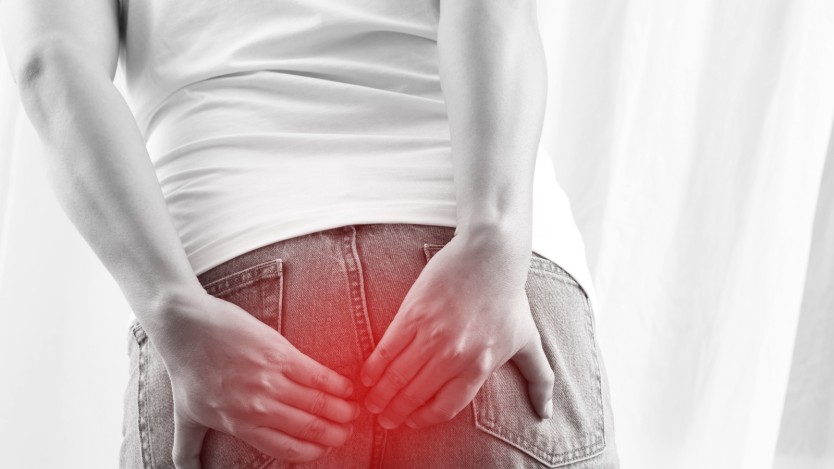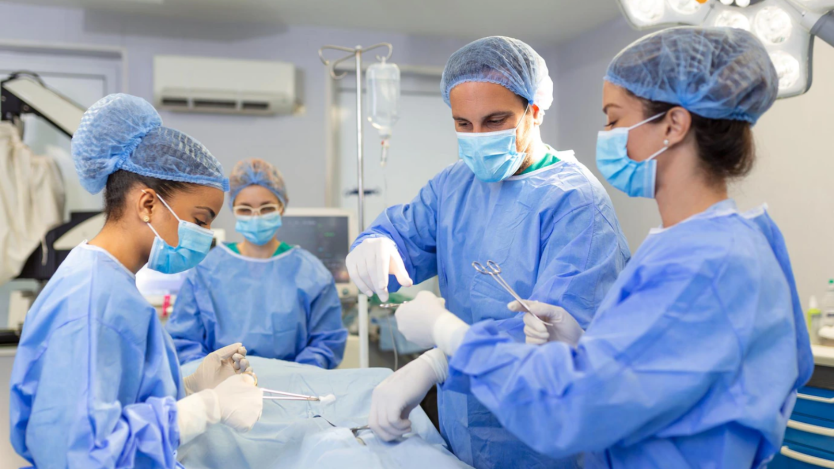Postoperative care of anal fissure surgery

- What is an anal fissure?
- Types of anal fissures
- Postoperative period after anal fissure surgery in hospital
- Postoperative period after anal fissure surgery at home
- Possible postoperative complications
- Laparoscopic inguinal hernia surgery is the minimally invasive alternative to conventional (open) surgery.
- With the laparoscopic technique, recovery will be much faster and the surgical wound will be hardly noticeable.
- The laparoscopic inguinal hernia operation takes between 45 minutes and 1 hour.
What is an anal fissure?
An anal fissure is a tear in the tissue surrounding the external opening of the digestive tract, commonly called the anus.

Do you need anal fissure surgery?
Request a free and immediate appointment with our specialists in General Surgery
The tissue surrounding the anus, which is mucous and purplish in colour, is easily broken, as it is much weaker than the surrounding skin.
Anal fissures commonly occur at the back of the anus. This is because it is this area that bears the most pressure when stool is passed and also the most tension when the sphincters that open and close the anal canal relax and contract.

Types of anal fissures
Depending on their mechanism of production, anal fissures can be classified into two different groups:
- Acute anal fissure: if its onset is less than six weeks and the patient has never had an anal fissure before (at least in the last two years). Acute anal fissures are usually superficial and the edges are clean and thin.
- Chronic anal fissure: these are usually fissures that last more than six weeks despite the conservative treatment recommended by the specialist. Also, if we regularly suffer from anal fissures in the same place, we classify them in this group. In this type of anal fissure, the fissure is deeper, the edges are thickened and hard to the touch.
It should be noted at this point that, although some acute anal fissures can be treated with the appropriate conservative medical recommendations, in many cases they become chronic. If this happens, the only possible and definitive treatment for their elimination is surgical intervention, called lateral internal sphincterotomy.

Operation for chronic anal fissure: internal lateral sphincterotomy
The surgical procedure used to treat a chronic anal fissure is the lateral internal sphincterotomy, which consists of cutting the internal anal sphincter on the side where the fissure is located.
The operation lasts a short 15 to 30 minutes.
Postoperative period after anal fissure surgery in hospital
The main advantage of lateral internal sphincterotomy is the short postoperative hospitalisation period, which usually lasts no more than two days, the symptoms disappear in the patient immediately after the operation and it is not usually an operation that causes complications.
It should also be noted that the recurrence rate of anal fissure is only around 2% of cases within eight months of the operation.
Immediately after the operation, during the first postoperative hours, the patient should be able to move around and get up. It is advisable to start walking a couple of hours after the operation, which will help the blood flow. In addition, the patient will be able to start tolerating food as soon as possible.
The patient usually leaves the hospital on his or her own feet the day after the operation or even the same day.

Postoperative period after anal fissure surgery at home
The postoperative period usually lasts between 3 and 4 weeks, from the operation until the surgical wound heals completely.
It is normal for the patient to feel pain and discomfort in the operated area after anal fissure surgery. In these cases, the specialist will usually recommend the intake of certain analgesic drugs to reduce the pain. In this way, the pain and discomfort will be reduced day by day. The medicines will have more effect if they are started immediately after surgery, without waiting for the pain to appear.
The patient should avoid physical exercise for at least the first two weeks after surgery to prevent the fissure from reopening.
Activities that are not recommended during the postoperative period are mainly weight lifting, sports and anal sex. You should resume sport and your daily activities as soon as you feel comfortable doing so.
Once at home, the patient can also return to a normal diet, although it is advisable to eat foods rich in fibre, such as fruit and vegetables. The diet should be accompanied by plenty of water. This will make bowel movements easier, with softer stools. Foods that are not recommended are spicy foods and, of course, alcohol, coffee or caffeine-containing drinks, as they can irritate the anal canal area.
Following this diet, it is normal for the patient to have their first bowel movement during the first three days after the operation. It is important that bowel movements occur every day, between once and twice. If constipation persists, either due to a previous pathology that caused the fissure or due to the patient's own fear of going to the toilet, the specialist may recommend taking laxatives.

When the patient needs to clean the wound, he/she should use sitz baths with lukewarm water two to three times a day. Sitz baths are performed by filling the bathtub or bidet with enough water to cover the surgical wound. These baths should last about 10 minutes, which relieves pain and soothes the surgical area. After defecation they are also recommended to avoid possible infections and complications.
Finally, the patient must not forget to visit the specialist to monitor the evolution of the surgical wound. These visits will be made for as long as the specialist considers necessary.
Possible postoperative complications
If, after the operation, the patient experiences suddenly increasing pain, bleeding, fever or swelling of the area, he/she should not hesitate to contact the specialist who performed the operation, as this could be an infection in the area that should be examined immediately.

Do you need anal fissure surgery?
Request a free and immediate appointment with our specialists in General Surgery
There are some cases in which the patient may suffer some flatulence incontinence or faecal incontinence (urgency and inability to hold back defecation for a long time). This complication occurs in less than 1% of cases.
Other associated complications, although also with a very low rate of occurrence (in less than 10% of cases) may be wound infection or bleeding from the wound.
However, despite these possible complications, anal fissure surgery is usually a success, with a very low rate of recurrence.
The best way to definitively eliminate the symptoms is therefore to undergo anal fissure surgery by a surgeon specialised in general surgery.
Medical disclaimer: All the published content in Operarme is intended to disseminate reliable medical information to the general public, and is reviewed by healthcare professionals. In any case should this information be used to perform a diagnosis, indicate a treatment, or replace the medical assessment of a professional in a face to face consultation. Find more information in the links below:
